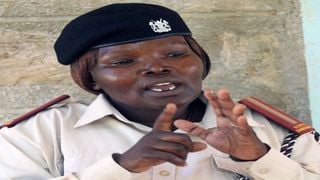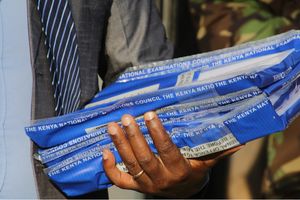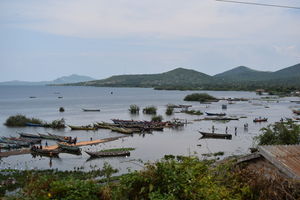
Barpelo location Chief Irine Kosgei during the interview last week.
| Sila Kiplagat | Nation Media GroupGender
Premium
Chief Irine Kosgei on a mission to wipe out FGM
What you need to know:
- Ms Kosgei was lucky that her life did not follow this traditional trajectory.
- In 2009, she formed Barpello women’s group, which had 30 members.
Swimming against the tide could well be her middle name.
Born and brought up in the windswept, unforgiving Barpello village, Tiaty Sub-County in Baringo County, she has not only defied entrenched patriarchy to become a government administrator but has also given a voice to the voiceless in a community where women were traditionally supposed to be seen and not heard.
Chief Irine Kosgei, 46, grew up in a cultural environment where girls were rarely taken to school. The few that were enrolled usually joined late, dropped out early and then underwent female genital mutilation (FGM). The cut paved the way for early marriage, in a cycle that reduced girls’ lives into an avenue for earning dowry for the family.
Ms Kosgei was lucky that her life did not follow this traditional trajectory.
A group of Catholic missionaries who had pitched camp near her home saw her through secondary education. They also mentored her spiritually, sowing the early seeds of her opposition to retrogressive cultural practices including FGM, early marriages and teenage pregnancies.
Birth complications
However, what goaded her into lifelong action against FGM was the experience she gained after accompanying her elder sister to the former Baringo District Hospital, where she (her elder sister) had been referred from Chemolingot Sub-County Hospital due to birth complications. Though the trip took place back in the 90s, it left an indelible mark in her and dramatically changed the way she viewed FGM.
Her sister’s complications, she learnt, had arisen from the fact that FGM had interfered with her birth canal. It was quite painful for Ms Kosgei that, while a doctor managed to help her sister deliver, the baby did not survive. This painted for her, in plain terms, the crude repercussions of FGM. From that day, she vowed to fight the vice and educate her peers on the dangers associated with it.
“It started at the Catholic missionaries’ camp, where I used to fellowship as a young girl. Together with a few other girls, we would go to the church, where I was enlightened on the importance of education. I also saw it fit to empower other girls from the locality to do anything possible to escape the cut, which pushed them to marriage at a tender age,” said Ms Kosgei.
“But it is when I took my elder sister to hospital due to birth complications caused by FGM that my eyes were opened to the actual dangers of FGM, especially after she lost her baby in the process. I vowed to rally my peers in the community not to be hoodwinked into the outdated cultural practice,” she added.
Sensitise girls
In 2004, she approached a priest, Fr David Cornway, who was serving in Barpello and shared her plans to traverse the FGM hotspots and sensitise girls, most of them illiterate, on the dangers of undergoing the cut.
“I told the priest that the church had to come out and condemn the vice that was claiming girls’ lives through excessive bleeding. After listening to me, he wrote a proposal that got me a vehicle and a driver to reach out to girls in the remote villages and schools in the region,” said the chief.
In 2005 and 2006, she toured schools and villages in Ng’oron, Nginyang’ and Kolowa divisions.
In 2009, she formed Barpello women’s group, which had 30 members.
“We registered it with the social services department and vowed that none of our daughters would be subjected to FGM. We kept the promise and the group is still active to date,” she said.
Through the initiative, another group dubbed Cheptunoyo women’s group was formed, which comprises of women who did not undergo the cut and champions children’s rights in the community.
Her ant-FGM campaigns earned her an opportunity to serve as a Catholic catechist in Marigat and Barpelo villages.
No walk in the park
Her employment as a chief in 2013 gave her formal authority to fight backward practices, a mission she says is no walk in the park for a woman.
“Being a female administrator here is a challenge because they do not value women. I, however, thank God that they slowly came to appreciate that women can do what men can do, even better if given a chance,” said Ms Kosgei.
“Though I faced resistance when I started out, I stood my ground and raided camps where girls were being circumcised, saving many,” she added.
Seven years after her appointment, the mother of seven has helped stamp out FGM in her location, with 90 per cent success in an area where the practice was quite rampant. Cases are nowadays only reported in a few remote areas, including Koibosiran and Katuwit villages, where schools are few and far apart.
“We are trying to convince our leaders to build even an ECDE centre in the area. Where there are schools, such cases are minimal as the learners get exposure,” said the administrator.
In Barpello Sub-Location, where the vice has virtually been eradicated, there are several private and public schools including Cheptaran, Barpello and Lomotom and several children have gone all the way to university.
The chief, whose key tool of trade is a wall chart, has incorporated men in her leadership as they wield a lot of clout in the community.
“We have several committees comprising men and women. This makes enforcement easy for me and my two assistant chiefs,” she said.
Men's role
Through public barazas, she also sensitises men on FGM, adding that many have confessed they did not know that the practice had such severe consequences.
The administrator says she was elated when Parliament passed a law prohibiting FGM in 2011, adding that she is also grateful for family support.
“My husband does not come from my community and is also against the practice. He encouraged me to fight on despite the resistance from the locals. My sisters and brothers also helped me a lot as they saw this as a mission to save future generations,” said Ms Kosgei.
It has not been easy, though.
The chief recalls a dramatic incident in 2014 where she stormed a female circumcision camp in Barpello village.
Four girls were all ready for the cut and duly stripped half naked. On seeing the chief and her party of volunteers, the circumcisers fled, leaving behind their helpless ‘clients’.
“I had no assistant chief by then. I had mobilised a few volunteers from my committees and we stormed the homestead at 5am. Initially, they thought I wanted to take photos. The ceremony was at its peak and the initiates were dancing half-naked,” narrated the chief.
“They even wanted to beat us up. The girls were crying and calling out my name. They were quite eager to graduate into womanhood. They even composed a very bad song for me in which they chanted: ‘What did the knife do that you had to interfere’,” the chief narrated amid laughter.
“I wanted to arrest the circumciser but she escaped. I, nevertheless, remember the then county commissioner Peter Okwanyo, Anti-FGM Board Chairperson Linah Kilimo and other leaders came to congratulate me at a public baraza in Barpello that was attended by hundreds of locals,” said the chief.
Alternative rites
Besides fighting the female cut, she has been conducting alternative rites of passage for girls during school holidays.
“I also encourage parents whose girls have graduated from universities to organise homecoming ceremonies so that others in the village can see that they can pursue degrees, graduate, get employed and return to serve the community as opposed to the cut and early marriage,” she explained.
A leader by example, Ms Kosgei reveals that her seven children went to prestigious national schools and some hold university degrees.
She is proud to have been part of the cultural change that means women can now address a gathering while standing. It is a major breakaway from the time she became an administrator in 2013. The community even warned her against putting on trousers.
“I had to convince them that they should not challenge the government as the chief’s uniform countrywide comprised a shirt and a pair of trousers,” noted the chief.
“I am not only happy as a chief, but I am also elated that as a mother, I have throughout been true to the advice of my mentor, Catholic priest David Cornway, who once told me: ‘If you save even one girl from being circumcised, you will have saved future generations’,” added the crusader.
Widely practised
Although FGM was outlawed nine years ago, it is still widely practised among the Pokot, Ilchamus and the Endorois communities in Baringo County.
In these communities, uncircumcised girls are considered “unripe” social pariahs who cannot freely mingle with those who have undergone the cut.
And while a circumcised bride gets more than 50 cows, an uncut one traditionally attracts way less in bride price. This prompts families to push for FGM in order to get more livestock when they marry off their daughters.
Among the Pokot, families that exempt their daughters from FGM risk being ostracised, which explains why hundreds of girls aged between 10 and 16 years are subjected to FGM and forcibly married off during the December and August holidays. The trend is deeply rooted in Ng’oron, Kolowa, Kakapul, Gulel, Atirir, Kongor, Nyakwala, Silale, Kositei, Akoret, Akwichatis,Toplen, Nasorot, Riong’o, Churo,Tangulbei, Paka and Natan.
In the past, FGM practitioners were highly revered and each would be given a gourd of milk as they were deemed to play a major role in what was considered to be a key rite of passage.
The times have, however, changed, thanks to the work Ms Kosgei and other unbowed crusaders have been doing up north.





